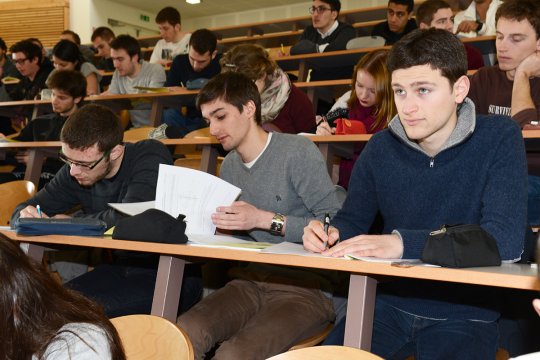
Two options are proposed by SUPMICROTECH-ENSMM for the master’s degrees available for students who have a foreign degree :
Complex systems engineering optionMaster's in Mechatronics, Processes and Microtechnology | Mechanical engineering optionMaster’s in Mechanical Design, Materials and Microsystems |
The goal is to train managers to enable them to implement methods and tools making it possible to optimise the design, development and manufacture of new products with a strong focus on micromechanics and micromechatronics.
These orientations are backed up by a strong regional culture in the area of micromechanics and microtechnologies and on the research activities developed at the FEMTO-ST research institute.
Course organisation
Course progression
The Master's comprises two years (M1 and M2). Each of the four semesters corresponds to 30 ECTS credits. The first three semesters correspond to the following types of training: classes, tutorials, practicals and supervised projects. The 4th semester corresponds to a research or industrial-type master’s internship
Four semesters of training
The training is designed to give the students the scientific and methodological basics and tools required to master the main disciplines in the courses proposed. The courses are broken down into four semesters :
- Adaptation semester
- Development semester
- Specialisation semester: choice of a pathway
- Professional immersion semester in Research and Development or Engineering
Backed up by research
The two master’s degree specialities are closely tied in with the FEMTO-ST Institute’s research departments and teams, in particular :
- Automation and Micro-Mechatronics Systems - Complex Systems Engineering option.
- Applied Mechanics Department - Mechanical Engineering option.
- Micro- Nanosciences and Systems Department - Mechanical Engineering and Complex Systems Engineering option.
- Time-Frequency Department - Mechanical Engineering and Complex Systems Engineering option.
Recruitment
The master’s degree is open to foreign students who have a Bachelor’s degree in the specialities concerned.
The recruitment procedures are different depending on the student’s country of origin :
- For European students, recruitment is based on qualifications, and is done by a jury bringing together the person in charge of the Master’s, the people in charge of the specialities and pathways, and the people in charge of the training modules.
- For students from outside Europe, consult the Campus France website to see the enrolment procedure.
Enrolment fees
- Enrolment fee for master’s first year : 1 103 €
- Enrolment fee for master’s second year : 1 103 €
Complex systems engineering option
Master's in mechatronics, processes and microtechnology (MPM)
The Mechatronics, Processes and Microtechnologies pathway is based on the recognised skills of the Automation and Micromechatronics (AS2M), the Micro- and Nanosciences and systems (MN2S) and the Time-Frequency (TF) departments in the areas of micro-robotics, micromechatronics, complex systems control, production systems engineering, innovative manufacturing processes, multi-physical microsystems, microsystem-based instrumentation systems and sensors and materials for advanced metrological applications.
In this context, the SUPMICROTECH-ENSMM Mechatronics, Processes and Microtechnologies pathway focuses on the design, development and control of mechatronic and micromechatronic components and systems by deploying production methods and innovative manufacturing and micromanufacturing processes. The training proposed combines fundamental scientific disciplines for modelling, designing and control (mechanics, electronics, automation, optics, production management and IT) with more technological aspects associated with microsystems (MEMS /MOEMS) and microtechnologies (micromanufacturing).
The skills acquired
- Mastery of simulation, design, characterisation and manufacturing tools regarding innovative components to make it possible, among other things, to solve problems relative to feed and control devices for these systems and microsystems,
- Development of flexible, modular and reconfigurable systems in the framework of small and medium series to enable the quick change from one type of production to another while minimising dimensions and energy consumption,
- Development of smart systems making it possible to develop new functions or products thanks to innovation in the framework of technological breakthroughs.
The target professions
The Mechatronics, Processes and Microtechnologies pathway trains mechatronics engineers to enable them to grasp all the issues related to the design of integrated mechatronic systems.
They will have to manage and organise a team of specialists working in the various areas concerned in order to break down the barriers between the different departments in industry and enable the creation of innovative products.
Mechanical engineering option
Master's in mechanical design - materials and microsystems
The Mechanical Design - Materials - Microsystems pathway is based on the recognised skills of the Applied Mechanics, the Micro- and Nanosciences and Systems and the Time-Frequency departments of the FEMTO-ST institute in the areas concerning the mechanical properties of materials, and the dynamics of structures and vibro-acoustics, the shaping of materials and the manufacturing and micro-manufacturing processes, the development of complex and innovative multi-physical microsystems.
The skills acquired
- Modelling of phenomena and complex systems,
- Solving concrete problems and proposing innovative solutions,
- Conducting an analysis combining criteria as varied as the functional, economic and environmental aspects.
- Innovating both at the level of designing products, and of production methods and manufacturing processes,
- Taking the environmental constraints into account both in the areas of energy control and of the optimisation of processes, structures and materials.
The target professions
The Mechanics - Materials - Microsystems pathway is based on varied teaching to adapt to various types of functions in research, development and engineering offices, in design and methods offices, and even in production.
The areas of activity cover a broad range of industrial sectors: mechanical industries, steelmaking, automotive and transport, aeronautics, biomedical, information and communication technologies, ...


